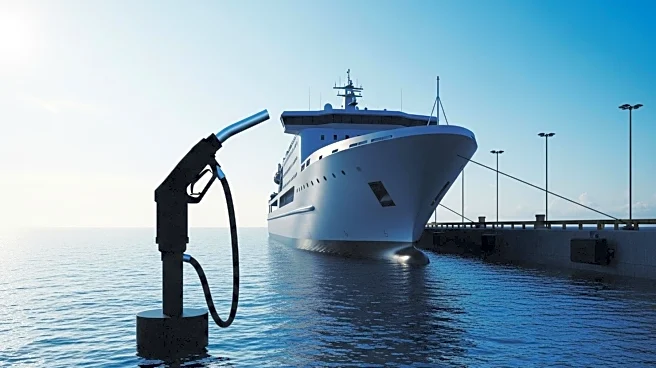What's Happening?
The Documentary Committee of BIMCO has adopted a Methanol Annex to its Bunker Terms 2018, marking a significant step in the maritime industry's transition towards alternative fuels and decarbonization. This annex introduces new definitions to accommodate developments in the bunkering landscape and emphasizes the importance of sustainability certification to verify the environmental credentials of methanol as a marine fuel. Nicholas Fell, Chairperson of BIMCO’s Documentary Committee, highlighted that the annex was developed in consultation with industry stakeholders and technical experts to meet practical and legal requirements. The annex allows parties to specify greenhouse gas intensity limits and methodologies for calculating emissions, ensuring adaptability to future regulations. Safety measures, including closed or remote sounding procedures, are mandated due to the toxic nature of methanol.
Why It's Important?
The adoption of the Methanol Annex by BIMCO is crucial for the maritime industry as it seeks to reduce its carbon footprint and comply with international environmental regulations. Methanol is considered a promising alternative fuel due to its lower emissions compared to traditional marine fuels. By providing a framework for sustainability certification and emissions calculation, the annex supports the industry's efforts to meet regulatory requirements such as the FuelEU Maritime. This move could accelerate the adoption of methanol, influencing fuel suppliers, shipowners, and regulatory bodies to invest in sustainable fuel solutions. The focus on safety procedures also addresses concerns about the handling of methanol, ensuring the protection of crew members during bunkering operations.
What's Next?
As the Methanol Annex becomes integrated into maritime contracts, stakeholders in the industry are expected to adapt their operations to align with the new standards. Shipowners and operators may begin specifying methanol in their fuel contracts, leading to increased demand for methanol bunkering infrastructure. Regulatory bodies might further develop guidelines to support the safe and efficient use of methanol as a marine fuel. Additionally, the industry could see advancements in technology and practices related to methanol bunkering, driven by the need to comply with the annex's requirements. This could foster innovation in fuel supply chains and encourage investment in sustainable maritime solutions.
Beyond the Headlines
The adoption of the Methanol Annex may have broader implications for the maritime industry, including potential shifts in fuel supply chains and increased collaboration between stakeholders to develop sustainable solutions. The focus on sustainability certification could set a precedent for other alternative fuels, promoting transparency and accountability in the industry. Furthermore, the annex's emphasis on safety procedures highlights the industry's commitment to protecting its workforce, which could lead to improved safety standards across other bunkering operations. As the industry moves towards decarbonization, the annex could serve as a model for future regulatory frameworks, influencing global maritime policies.










